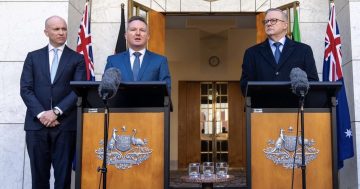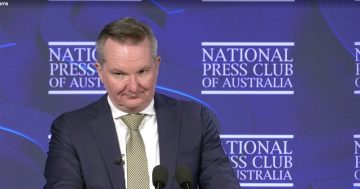
The Australia Institute has raised concerns over potential conflicts of interests on climate change advice. Image: File.
In a year where conflicts of interest impacting the public sector have been centre stage, it is a little surprising the government isn’t going out of its way in every instance to demonstrate that its own agencies are free from questionable governance issues.
The Albanese government is well-placed to make the most of it, as the big ticket scandals to have been either exposed or inquired into this year all mostly happened on the Coalition’s watch.
Robodebt, PwC, procurement and Pezzullo have all played out in a big way this year, but the conflicts and antics that sparked the scandals actually took place in previous years.
Labor can easily shine the spotlight of blame onto the former government – and it is doing just that.
But you would think Labor in government would also be going all out to make sure it wasn’t heading down a similar path.
Take the Climate Change Authority, for example.
It is the agency legislated to advise the government on its climate policies.
After Labor won last year’s election, Climate Change and Energy Minister Chris Bowen made quite a noise about boosting the importance and independence of the CCA.
Recently, the CCA has released several key pieces of work, including the annual progress statement assessing the government’s climate policies and two reviews – the government’s carbon credit scheme and the National Greenhouse and Energy Reporting scheme.
Its advice has been somewhat underwhelming and hardly critical of the government’s fossil fuel plans and its promotion of carbon offsets.
This isn’t so surprising when you look at the makeup of the CCA’s board and some in senior paid roles.
The chair is Grant King, a former fossil fuel executive and now the chair of one of Australia’s largest carbon offset developers.
Five of the eight CCA board members are employed by organisations that are materially invested in carbon offsets or fossil fuels.
In an attempt to demonstrate how independent its review of offsets was, the CCA published a statement saying Mr King and another board member had been excluded from the review.
That’s quite an admission that both might have conflicts of interest.
It also has implications for Mr King’s role as chair if he can’t preside over the authority’s meetings.
There is no accusation here that Mr King has acted inappropriately at all.
The Authority’s Act, however, explicitly prohibits an authority member from engaging in paid employment that conflicts or may conflict with the proper performance of their duties.
Leftwing think tank the Australia Institute has jumped on this and even pointed out what it sees as obvious conflicts of interest in Mr King’s appointment to the CCA board.
Its director of the institute’s climate and energy program Polly Hemming even wrote to the Minister earlier this year raising concerns over the offsets review and the overall conflict of interest perception.
Mr Bowen wrote back and the institute has made the letter available publicly. It has also sought and received under FoI other information about the interests of board members and senior employees at the CCA
In his response, the Minister thanks Ms Hemming for raising the issue with him and admits that there had been a statutory breach in relation to the offsets review.
But he dismisses all other concerns on advice from his own department and the CCA itself.
“Given the nature of the matters raised in your letter, my department sought further information from the authority on its management of potential conflicts of interest,” Mr Bowen wrote.
“I am advised that aspects of the meeting procedures adopted for the Authority’s 2022 Review of International Offsets were not in keeping with relevant requirements.
“The Department of Climate Change, Energy, the Environment and Water has made enquiries with the Authority and determined the integrity of the review was maintained.
“I also understand the Authority has since strengthened its procedures, which are outlined in the Authority Charter published on its website.
“The Department has examined your letter and does not accept the remaining concerns raised therein. Informed by this, I do not consider further action to be necessary.
“The measures the Authority has in place for managing members’ interests are appropriate to facilitate compliance with relevant requirements under the Climate Change Authority Act 2011, the Public Governance, Performance and Accountability Rule 2014.”
The institute responded detailing a list of what it says are the CCA chair’s conflict of interests and suggest his position is untenable.
It also questions the validity of the Minister relying on his own department on probity issues.
The Minister took the Australia Institute’s initial letter seriously and responded respectfully after having the matter checked out.
What he should take more seriously, however, is the whole notion of conflict of interest.
After a year of justified public outrage over how the public sector has allowed private sector interests to rort taxpayer dollars and infiltrate policy decisions, the Federal Government should be portraying an image of ‘over-the-top’ circumspection in its appointments – and avoid even the appearance of clashing interests.
Original Article published by Chris Johnson on Riotact.











